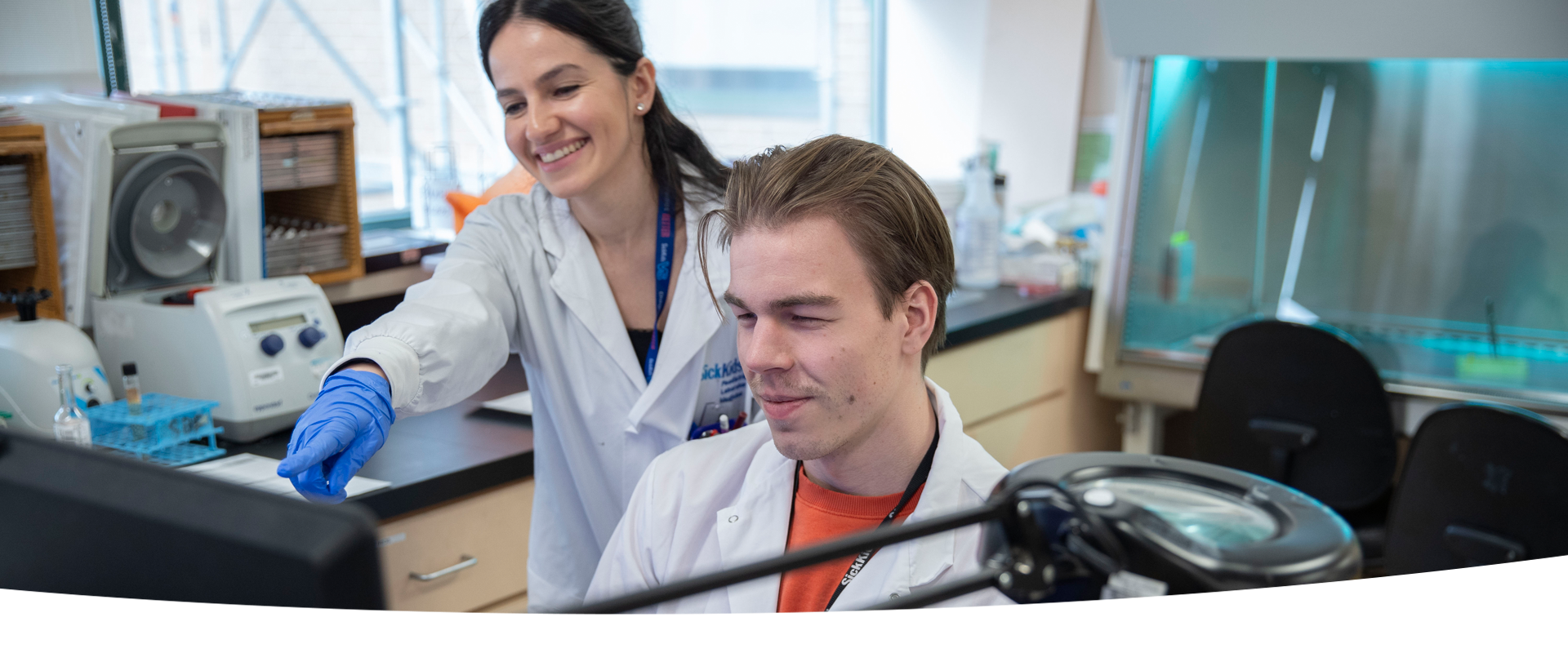
DPLM Education & Training
The pursuit of excellence in educational endeavours is one of the key missions of the Department of Paediatric Laboratory Medicine (DPLM).
Members of DPLM contribute many hours of teaching to University of Toronto undergraduate, graduate and professional students. The practice of laboratory medicine is taught within accredited programs in all the divisions. In addition, educational programs in laboratory medicine, as it applies to clinical disciplines, exist for areas such as general paediatrics, clinical genetics, haematology/oncology and infectious diseases.
In collaboration with The Michener Institute for Applied Health Sciences, St. Lawrence College and Ontario Tech University, DPLM has an active educational program for technicians/technologists in training, providing a unique opportunity to train future technologists in laboratory medicine as applied to paediatrics. DPLM members also reach out to the community, sharing their particular expertise in the diagnosis and management of childhood illnesses.
Annual Laurence E. Becker Symposium – Advances in Paediatric Laboratory Medicine
In affiliation with the Department of Pathobiology and Laboratory Medicine at the University of Toronto, DPLM offers an annual educational program on recent advances in paediatric laboratory medicine. Since 2003, the symposium has been named after Dr. Laurence E. Becker, the founding Chief of Paediatric Laboratory Medicine.
The symposium features national/international speakers and is attended by laboratorians and other health-care providers from across Ontario.
The format of the symposium includes presentation by keynote speakers in the morning, followed by poster sessions in the afternoon. Awards are presented for the best posters in a number of categories, including graduate students, fellows, clinical residents and technologists.
This education event is approved as an Accredited Group Learning Activity under Section 1 of the Framework of CPD options for the Maintenance of Certification, RCPSC.
Clinical Biochemistry
The training activities of the Division in Clinical Biochemistry span every level of postsecondary education and the program is among the largest in Canada.
Uniquely tailored programs have been devised for:
- Trainees in Medical Laboratory Technology from the Michener Institute
- Fellows in the Postdoctoral Training Program in Clinical Chemistry and medical residents in Endocrinology from the University of Toronto
- Clinical Pharmacy Residents
- Clinical Pharmacology Fellows
- Genetic Metabolic Fellows
- Canadian College of Medical Genetics Fellows
- Several other medical specialties
Recent development of a fellowship program funded by the Sanford Jackson Endowment has allowed us to train postdoctoral fellows in Paediatric Clinical Biochemistry. These include the recent international visiting scientists and clinical biochemists from various countries.
Genome Diagnostics
The Division of Genome Diagnostics is the accredited training centre for the Fellowship of the Canadian College of Medical Geneticists for Molecular Genetics and Cytogenetics.
Microbiology
The Divison of Microbiology supports training programs for laboratory technologists, laboratory technicians, medical microbiology and paediatric infectious diseases residents. Research interests include viral respiratory infections, the microbiology of cystic fibrosis, the study of invasive fungal infections and related rapid diagnostics, clostridium difficile infections in children, standards of practice for diagnostic paediatric microbiology and the applications of molecular microbiology to paediatric infectious diseases.
Pathology
The Division of Pathology’s educational activities cover a broad range of students, including laboratory technologists, laboratory technicians, pathologists’ assistants, pathology and neuropathology residents, and clinical fellows, as well as undergraduate teaching at the University and national webinars.
A wide spectrum of paediatric disorders is included annually in the 6,000 surgical specimens and approximately 250 neonatal and paediatric autopsies, including forensic cases. There are active biopsy programs in liver, kidney, gut, heart and neuromuscular disorders.
The Division is staffed by eight pathologists and four scientists and has advanced facilities for electron microscopy, immunohistochemistry and molecular pathology. In addition to a full complement of paediatric specialties SickKids boasts an active and integrated Research Institute. There are well-established department research programs for a number of paediatric disorders, including SIDS, the molecular basis of childhood neoplasia, and renal, lung, neural, cardiac and gastrointestinal diseases.
Paediatric Anatomic Pathology Fellowship
The Division offers a fellowship in paediatric anatomic pathology for a one-year appointment, renewable for a second year. The first year provides comprehensive experience in paediatric autopsy and surgical pathology.
Fellows participate in resident teaching and clinical conferences, and are encouraged to undertake a research project. For those desiring a second year, there is the opportunity for more extended research experience and training in molecular techniques as applied to the diagnosis of paediatric disease.
The applicant must have an MD degree or certification, or Board eligibility in pathology.
Dependent on level of training.

